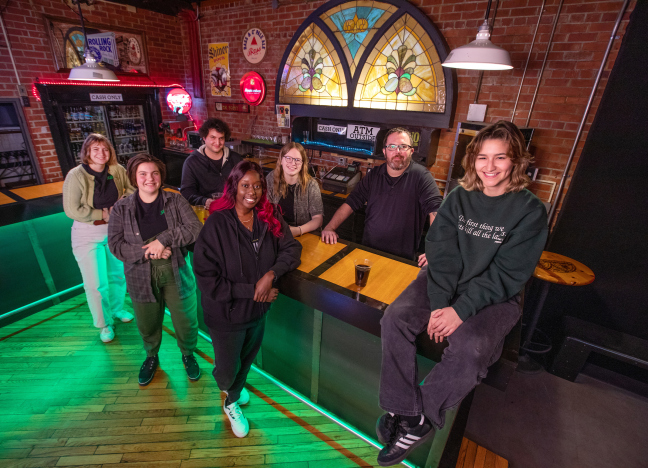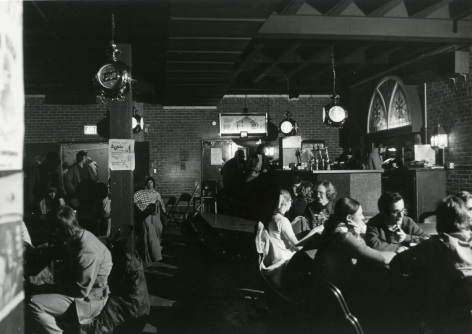
Since the Maintenance Shop opened 50 years ago, ISU students have been the driving force that keep the performance space rocking. Pictured here at the M-Shop bar are some of the students and staff who have helped lead the venue in recent years. From right: Aryana Bermeo, Student Union Board (SUB) M-Shop director; Jim Brockpahler, entertainment programs coordinator; Allison Talyat, SUB M-Shop director; Poni Okene, SUB special events director; Hassein Rife, former M-Shop head audio tech and former M-Shop student director; Dorothy Sargent, SUB vice president of administration; and Emily Durbala, SUB performing arts director. Photo by Christopher Gannon/Iowa State University. Larger image.
July 28, 1981. Dressed impeccably in a three-piece gray suit and white hat, blues great Albert King strides down the single staircase from the tiny green room and onto the stage of the Maintenance Shop at Iowa State University. His world-class band revs up the capacity crowd with a funky instrumental. King places his hat on an amplifier, slings his trademark Flying V guitar over his shoulder and, with a cigarette dangling from his lips, starts to play.
Fifty years of live performances hasn’t changed the Maintenance Shop all that much. The iconic stained-glass window still casts its orange glow behind the stage, which sits along the western wall and provides a view of the action from three sides. The bar is still tucked in the back corner beneath its own stained-glass window. ISU students still provide much of the work and leadership necessary to keep the intimate performance venue functioning.
The room even retains the musty-basement-with-hints-of-cleaning-products scent that has welcomed patrons for decades, at least since smoking was prohibited in 1998.
A few other things in addition to the no-smoking policy have changed since the M-Shop opened, of course. Food service ended in 2004. The entrance and box office were renovated somewhere along the way. And the number of shows per semester has fluctuated through the decades.
But the most important M-Shop feature remains as true in 2024 as it was in 1974: There’s not a bad seat in the house.
This January marks 50 years of live music and events at the Maintenance Shop. The small club and performance space on the ground floor of Iowa State University’s Memorial Union has hosted some of music’s greatest legends, scrappy upstarts and everything in between. The milestone has prompted students and staff who dedicated their time to the club to reflect on its legacy and plan a year-long celebration.
So get ready to celebrate with a musical trip down memory lane. But have some hearing protection ready because it might get loud.
Origins of an award-winning club
As the 1970s dawned, the space on the ground floor of the Memorial Union served as a real-life maintenance shop, housing tools and machinery for the workers and technicians who handled building repairs, electrical, plumbing and heating and cooling. An expansion of the Memorial Union left the area vacant, and students organized to convert the room into a dedicated venue for musical and theatrical performances.
“Model T” and “Old Maintenance Shop” were tossed around as names for the new venue. The Student Union Board, the student-run campus events programming committee that oversees events at the Memorial Union, selected “the Maintenance Shop” as the official name during a meeting on Oct. 17, 1973, according to a chronology of the early history of the venue assembled by Larry D. Grant, a 1974 ISU alum who was a member of the Student Union Board. The M-Shop officially opened on Jan. 7, 1974, though its first dedicated musical performance, featuring the Jug Band, wasn’t until Jan. 31 of that year.
Thus, a legend was born.
Organizers wanted to give the Maintenance Shop a memorable visual identity that would reinforce an atmosphere of creativity and artistry. They bought a stained-glass window at a country church auction for $150, according to Grant’s chronology. When they discovered the window was too tall to be installed behind the stage, they divided it into two segments. One became the backdrop for the stage, while the other went behind the bar. They commissioned artist Jane Sassaman to create an Art Nouveau display depicting a woman in a flowing purple gown and stars in her hair holding a sign on which the dates of upcoming performances could be listed. The words “Maintenance Shop” flow above the woman’s head in a kaleidoscopic typeface.
The stained-glass windows remain in place today, and the schedule display currently resides in a glass case in the Memorial Union entryway opposite the M-Shop entrance.
The club quickly earned a renowned reputation for hosting A-list folk, jazz and blues musicians who routinely sold out the venue. The club also collaborated with Iowa Public Broadcasting to produce “Jazz at the Maintenance Shop,” a television series that was syndicated around the world.
“The shop was the place to be if you wanted creativity and energy,” said Dan Rice, who managed the Maintenance Shop from 1980 to 1984.
The M-Shop enticed artists and graphic designers with free entry to shows in exchange for original ticket illustrations, making each stub a keepsake, said Rice, who enrolled at Iowa State to pursue a degree in philosophy after several years working in bars and restaurants in the Des Moines area. Rice paused his studies after his grades fell short of the program’s expectations, and the M-Shop job enabled him to stay connected to the university community and to soak in the creative energy of the Ames arts scene, he said.
The venue became a hangout for music fans and free thinkers, and Rice recalled students packing the place on Friday afternoons after classes ended. The M-Shop also booked performances on the Memorial Union terrace, allowing patrons to spread out and enjoy the outdoors air.
“The Maintenance Shop was too small for a lot of the big ideas we had, but we found ways to do them anyway,” said Rice, who later finished his degree and is currently the transfer and outreach relations officer for the ISU College of Liberal Arts and Science.
In 1981, the Maintenance Shop teamed up once again with Iowa Public Broadcasting to record a blockbuster series of eight concerts featuring seminal blues artists. Most of the dates for what became the “Maintenance Shop Blues” series comprised two performances from each artist as well as a recorded interview that took place in the Memorial Union. The lineup included Taj Mahal, Albert King, John Lee Hooker, Lonnie Brooks, Muddy Waters, Willie Dixon, Koko Taylor and James Cotton.
Legend after legend after certified blues legend.
IPTV edited and televised the performances, some of which can still be found online. The “Maintenance Shop Blues” performances required additional lights, a stationary camera and two hand-held cameras to be crammed into the room along with the artists and sold-out audiences, Rice said.
Rice recalled how John Lee Hooker, whose signature songs include boogie blues bangers like “Boom Boom,” performed on the M-Shop stage while it was still arranged for performances of the play “The Mousetrap.” Hooker and his band set up among the theatrical scenery and played as if it didn’t bother them in the least, delivering raucous performances that got the crowd shaking and sweating.
A third public broadcasting series, titled “At the Maintenance Shop,” helped the club cement its reputation as one of the premier blues clubs in the world, and the Maintenance Shop received the W.C. Handy “Keeping the Blues Alive” award for best blues club in 1994.
Student Involvement
June 14, 1991. An up-and-coming Chicago-area band called the Smashing Pumpkins plays the M-Shop less than three weeks after the release of the band’s debut album “Gish.” The gig generates scant attention, perhaps due to many ISU students being away for summer break. Pumpkins frontman Billy Corgan derides the M-Shop audience as a “simple rock” crowd during the performance, according to a brief writeup in the June 18 edition of the Iowa State Daily, which also features a frontpage photo of Corgan. Guitarist James Iha tells The Daily reporter the band won’t return to Ames any time soon. The Smashing Pumpkins ascend to rock godhood in just a few months’ time, and the band comes back to Ames on Oct. 19, despite Iha’s statement to the contrary, this time playing in the 2,600-seat Stephens Auditorium and sharing the bill with fellow alternative rock icons Pearl Jam and Red Hot Chili Peppers. “Gish” would attain platinum status and become one of the bestselling independent albums of all time. The Smashing Pumpkins would outgrow clubs of the M-Shop’s size at blinding speed and never look back.
The M-Shop has given ISU students an opportunity to get their feet wet in the live event industry since it opened its doors. And students have kept M-Shop programming current in the fast-evolving landscape of popular music. As the sound of independent and alternative rock took over the airwaves in the second half of the ’80s and throughout the ’90s, the M-Shop kept up with the times by hosting the Replacements, Bob Mould and the Smashing Pumpkins. Since 2010, the M-Shop has hosted the likes of Lake Street Dive, Twenty One Pilots and the Lumineers as each act was on the cusp of breaking through to the big time.
Jim Brockpahler, the entertainment programs coordinator for the M-Shop and an advisor to the Student Union Board, said the M-Shop hires 18 to 20 student employees in a given year. Students help select programming, tend the bar, run the audio and technical gear and staff the box office.
Brockpahler said students rarely have the opportunity to get that kind of comprehensive hands-on experience with live events and entertainment. He knows of only a handful of universities across the country that have clubs comparable to the M-Shop.
The Maintenance Shop inspired Marion native Hassein Rife to transfer to Iowa State from the University of Iowa. Rife, who graduated from Iowa State in December with a degree in electrical engineering, visited Ames in 2019 to see Tiny Moving Parts, one of his favorite bands, perform at the M-Shop.
“I didn’t expect a university to have a proper music venue in one of its main buildings,” Rife said. “I thought it would be a compromised experience in some way, but I was pleasantly surprised to find out it was a real rock club.”
Rife had experience in audio-visual technology, and a chance to work with bands at the Maintenance Shop motivated him to transfer. He started working as a shadow sound tech at the M-Shop and quickly advanced to head tech, a job he held until graduation.
His experience came full circle when Tiny Moving Parts returned in March of 2020. The show, which featured four bands, sold out. This time, Rife wasn’t just a fan in the audience. He managed the live sound needs for the entire gig.
Rife’s M-Shop tenure taught him that live sound production could be a profession, and he took a position with Pinnacle Recording and Productions, an Ankeny-based audio engineering company, upon graduating.
Rife said the Maintenance Shop’s wraparound stage and the location of the sound booth in one of the rear corners present sound techs with some challenges. That layout means the sound of a performance can differ significantly depending on the location of the audience member, and those differences aren’t always apparent to someone perched in the sound booth. So Rife said he learned to rove around the room to make sure every audience member was getting a satisfactory sound.
The M-Shop became a second home for Rife throughout his tenure as lead sound tech. He found it difficult to miss a show, even when he wasn’t scheduled to work. Among his favorite spots in the club is a gear closet connected to the sound booth. Decades worth of stickers and inscriptions cover the closet walls, artifacts left behind by previous M-Shop employees and students. Studying those inscriptions makes Rife feel like he’s part of a rich and storied tradition.
“I wanted to be at every show, whether I was working or not,” Rife said. “You never know what night is going to be a really special experience.”
The M-Shop has a long tradition of giving students a chance to shine on stage as well. Theatrical performances, both those produced by ISU students and touring productions, have taken place there since the beginning. For many of its early years, theater and live music alternated on the M-Shop’s calendar, and a lively production of the musical “The Man of La Mancha” predated the first concert on the M-Shop stage by nearly two months. The M-Shop provided a setting for daring performances that might not have been permitted in other venues in the area, said Kathy Svec, who spent more than a decade as the marketing director of the Memorial Union until her retirement in 2010.
Svec started working in the Memorial Union in the late ’70s and held several positions during her career. As programming director for the Memorial Union, part of her job responsibilities included supervising the Maintenance Shop. She said students produced plays as well as risqué sketch comedy programs with late-night show times. Svec fondly recalls a particular performance in the 1980s that may or may not have involved a horse being led through the venue.
“The Maintenance Shop became this additional opportunity on campus for students who felt there just were not enough opportunities to perform in live theater,” Svec said.
In fact, the Maintenance Shop allows ISU students of all stripes to spread their creative wings and jump on stage. Grandma Mojo’s, a student improv comedy troupe, has performed at the M-Shop for decades, and the Cyclone Voice, the university’s premiere singing competition, hosts its preliminary round at the M-Shop as well.
Lately at the M-Shop
April 9, 2012. The Lumineers release their self-titled debut album on Dualtone Records, and the supporting tour hits the Maintenance Shop a few weeks later. An eager audience packs the venue, and Jim Brockpahler, less than a year into his job at the M-Shop, recalls getting crammed next to one of the main speakers near the stage while the band plays “Ho Hey,” the folk-pop anthem soon to propel the Lumineers onto some of the world’s biggest stages. “Ho Hey” will be streamed over 1.1 billion times on Spotify by 2024.
The number of performances held at the Maintenance Shop ebbs and flows from year to year, Brockpahler said. The pandemic of 2020 brought virtually all live performances to a screeching halt, and the venue changed some of its policies and procedures in the wake of the pandemic-era disruptions. But the Student Union Board hosted around 100 events in the fall of 2023, attracting a combined total of roughly 100,000 patrons. The M-Shop remains a cornerstone of the Student Union Board’s programming, Brockpahler said.
Brockpahler is working on scheduling a series of events to commemorate the M-Shop’s 50th anniversary. The schedule isn’t ready for publication yet, but he teased that some old favorites with long histories of performing at the M-Shop are likely to return.
Brockpahler said the intimacy of the M-Shop makes it stand out from most other live music venues. The wraparound stage configuration allows for audience members to surround the performers on all sides but one. The room’s capacity is 195 for standing-room shows and 150 for seated performances. The combination of the modest capacity and room layout means there isn’t a bad seat in the house, and M-Shop shows tend to attract an appreciative audience of music afficionados, often resulting in a “listening room” atmosphere where the music truly takes center stage.
“At the Maintenance Shop, you’re treated to a personal show, and the audience gets immersed in the experience,” he said.
Svec agreed.
“The magic is being just a few feet away from incredibly talented people who tell wonderful stories and play astonishing music, much of it original,” Svec said. “That’s the magic of the Maintenance Shop.”







